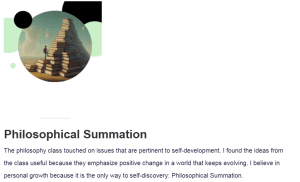
Philosophical Summation
The philosophy class touched on issues that are pertinent to self-development. I found the ideas from the class useful because they emphasize positive change in a world that keeps evolving. I believe in personal growth because it is the only way to self-discovery: Philosophical Summation.
In particular, it opens one’s mind to be receptive to new ideas and makes one eager to improve oneself in different aspects of life, including work, social relationships, lifestyle, and financial aspects. Further, the class reinforced the concept that learning should be continuous and that at no point should anyone say they have learned enough. By striving to become a better version of oneself, one gains a sense of fulfillment and confidence.
Care for the Soul
Plato presents the concept of ‘care for the soul’ as the best way to improve oneself. Whereas some people look at religion as the institution that could help them find themselves, Plato strongly makes the case for philosophy as the truest path to finding and understanding oneself (Campbell, 2021). Plato recommends a philosophical method known as dialectic as a way of seeking answers to questions on wisdom, virtue, happiness, and the soul. The concept is explained through two analogies: the divided line and the cave.
The analogy of the cave delves into the concept of enlightenment by highlighting the circumstances facing people chained and stuck in a cave. Plato avers that if someone unchains them and allows them to face the source of light, they are unlikely to be uncomfortable at first. However, they can ultimately get used to the new environment and adapt. Plato uses the analogy to aver that the knowledge-seeking process and enlightenment may be uncomfortable initially (Campbell, 2021).
However, with time, one learns to be comfortable with the truth after realizing how things work. On the other hand, the direct line analogy refers to an individual being able to separate themselves from the cave of bodily desires. Subsequently, the individual should be able to chart the right path after being able to distinguish the good and the bad and having the mental will to avoid the bad.
The ‘care for the soul’ concept has been quite helpful in my personal life and business. In particular, I previously believed that to make a successful career, one had to stick to conventional employment. However, using insights from Plato’s care for the soul, I have since discovered that I can create a successful career in the informal sector.
No Need to Fear Persecution or Death
Socrates argues against people’s tendency to fear death. His argument is premised on the idea that death is inevitable (Buetow et al., 2009). If history is anything to go by, death is inevitable, and everyone is going to die. To understand this even better, most of the great-grandfathers of the current generation are likely to have died a long time ago.
It is, therefore, needless to fear death as it can make one not live a fulfilling life. Socrates argues that the fear of death is what pushes people to flock to religion in the hope that they will live eternally (Buetow et al., 2009). However, this is not possible because, eventually, people will die regardless of their religious affiliations while they were alive.
Despite the idea of eternal life being attractive, there is a need to be cognizant that human life is perishable, hence the awareness of limited time on earth. After accepting that time on earth is limited, one is likely to focus on what matters and ignore the frivolous and inconsequential. If there were no urgency about life coming to an end, then people would live without purpose. One may not see the need to leave bed every morning, live a healthy lifestyle, pursue goals, and care about their loved ones.
People tend to relax if they know that something will not kill them or that they will not suffer the consequences if they fail to do something the right way. Learning to accept death or persecution is fundamental because that is how value systems are formed, give meaning to life, tell people what to avoid, and guide humanity in the right direction.
The idea of not fearing death has been fundamental to my personal development. I used to be risk-averse when approaching the entrepreneurship spectrum. For a long time, I avoided acquiring a digital asset that I would use to trade my skills. I wondered what would happen if the asset failed to break even.
The fear delayed me from investing, but I realized how fleeting time can be. Since I realized that I could die anytime, the urgency to exploit my potential before then set in, and it has since been nothing but rising from greatness to greatness.
Philosophy and Happiness
According to Bortolotti (2009), happiness is philosophically defined as a state of mind and a sense of prosperity in life by the person leading it. The first definition that argues that happiness is a state of mind implies that one’s happiness largely depends on inner feelings. To put this in perspective, an individual can be happy if they learn to be contented with whatever they have or accept the situations they are in currently.
This school of thought is based on the idea that there can never be enough to completely satisfy people. In other words, happiness is not a destination one can reach ultimately, but a change of attitude to enjoy the journey of life.
On the other hand, the second perspective of happiness attaches value to happiness. In other words, happiness is what improves one’s well-being, serves one’s interests, and benefits them (Bortolotti, 2009). As per this perspective, an individual will view themselves as happy if they are in an enviable position.
Having reviewed both perspectives, I have realized that happiness is more of a state of mind rather than achieving some value. While achieving value is great and welcome, one should learn to be happy regardless of the situation they face. Since I learned this philosophy, I constantly seek happiness regardless of the situation I face. For instance, lately, I hitch hike to balance my emotions and avoid work-related stress.
Conclusion
In summary, the philosophical concepts learned in class are key to constant self-improvement. The ‘care for the soul’ concept is vital for knowledge development as it helps one have an open mind when approaching issues. With an open mind, one will learn how to approach different issues.
Secondly, the philosophy of not fearing death and persecution bolsters one’s self-improvement since it introduces a state of urgency. To that end, people focus on self-improvement since they know they have limited time. Finally, the philosophy of happiness avers that happiness is a state of mind; hence, people should focus on the little things that make them happy instead of pegging happiness on value.
References
Bortolotti, L. (Ed.). (2009). Philosophy and happiness. Palgrave Macmillan.
Buetow, S., Mcallum, C., & Upshur, R. (2009). Using philosophy to help manage the fear of death. Journal of Palliative Care, 25(2), 111–116. https://doi.org/10.1177/082585970902500206
Campbell, D. R. (2021). Self‐motion and cognition: Plato’s theory of the soul. The Southern Journal of Philosophy, 59(4). https://doi.org/10.1111/sjp.12429
ORDER A PLAGIARISM-FREE PAPER HERE
We’ll write everything from scratch
Question 
Philosophy Final
In your philosophy final, you will write a short essay addressing the problem of how this Introduction to Philosophy, the Art of Questioning, relates to your life.
The title of the paper will be “Your Name: A Philosophical Summation,” “Your Name’s Apology,” “A Prince George’s Symposium.” Or something similar.
In this paper, you will take three of our main ideas and show how they help to explain your life. By “main ideas” I mean any idea that you have encountered in this class. It can be something like the following:
- • The unenlightened life of most people
- • Living in prejudice and ignorance
- • The difficult ascent from ignorance to knowledge
- • The conflict between the knower and the ignorant
- • Care for the soul
- • Philosophy as gadfly
- • No need to fear persecution or death
- • The sacred nature of all life
- • Man’s role on earth
- • The role of doubt
- • The search for enlightenment
- • Philosophy and happiness
Or it can be something that you have thought up on your own.
- • Using philosophy to think through my career choices
- • My parents’ philosophy
- • Why we need philosophy today
- • Why I want to study more philosophy
- • My disorientation in Philosophy 1010

Philosophical Summation
Your paper will have a 1-2 sentence introduction, setting the scene—telling a bit about the class, naming the three ideas that interested you the most, and then explaining in 1-4 sentences how these ideas relate to you.
I. Main Idea 1
- A. State the idea
- B. Explain it
- C. Explain what it has to do with you. Be totally specific and precise—names, places etc. You may fictionalize.
- Add images and videos if you wish
II. Main Idea 2–same outline as above